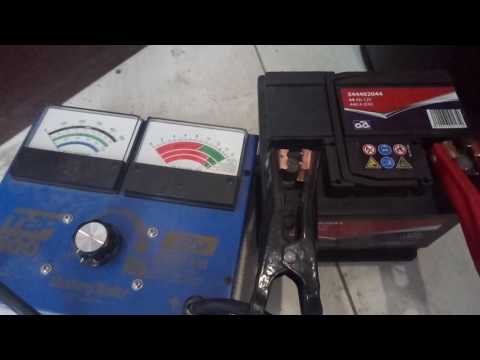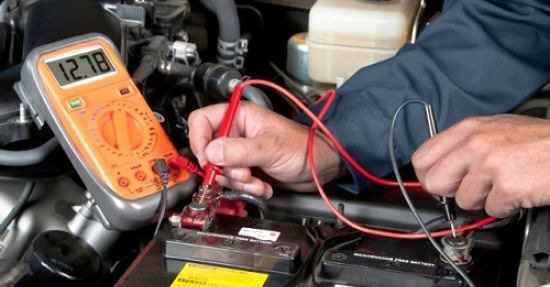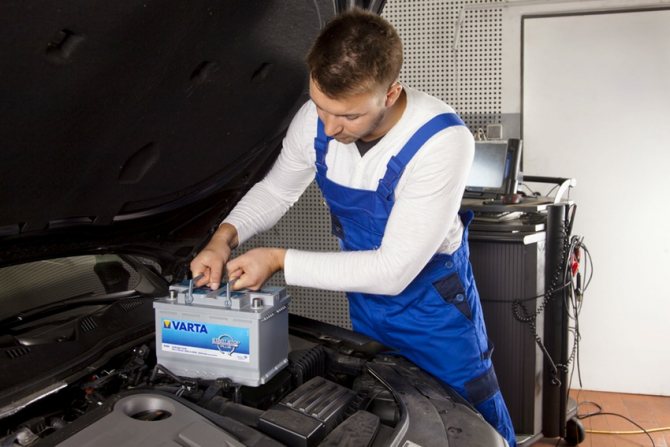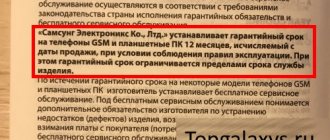When purchasing a battery complete with a car or separately, the buyer has the right to count on a warranty. A complex device is expensive, the energy replenishment processes are specific, and it is difficult to determine why the energy source failed. Therefore, the responsibility for the correct high-quality assembly of the device lies with the manufacturer; he provides a guarantee on the battery. The owner is responsible for violation of the operating conditions. In controversial cases, an examination is required.
Gradation of warranty battery faults
When purchasing a battery, we receive guarantees from the manufacturer for technical support by signing the terms in the warranty card. Typically, the plant is responsible for its products for 6 months or a year. But it happens that the warranty period for car batteries extends to 3-4 years, and the contract is accompanied by additional conditions that you should familiarize yourself with. Typically, this is periodic battery maintenance at an authorized service center.
The manufacturer's battery warranty includes defects that are classified as poor workmanship. There are obvious reasons that are identified in the first 6 months from the start of using a car battery.
- An open circuit is a poor-quality connection of the cans into the battery. If there is a lack of penetration at the connection points, the resistance increases, the contacts oxidize, and breakage occurs. The car battery fails and is covered by the manufacturer's warranty.
- Short circuit - when assembling the plates, the distance between the plates or the integrity of the separator is broken. As a result of the breakdown, the bank does not work. The battery does not receive 2.1 V of charge. The electrolyte in the jar is boiling, its density in the defective jar is low. The case is guaranteed, but only in the first months of operation. In the future, it will be difficult to prove that you did not drive over potholes and did not puncture the separator.
- The destruction of the case is not the fault of the owner when the lid is unsoldered and electrolyte leaks. The crack may not be visible, but the strong smell of acid can be felt under the hood. That the damage was not the fault of the user still needs to be proven.
- It is even more difficult, and often impossible, to prove that the rupture of some electrodes in the battery case occurred due to the fault of the manufacturer, poorly formed active mass falls off the plates, the low density of the filled electrolyte does not allow the use of a car battery in winter and it froze. Only an examination can give an opinion whether a given case falls under guarantees
Malfunctions and defects of batteries eliminated under warranty
What kind of damage is covered by the battery warranty? There are two undeniable cases: open circuit and short circuit. Let's take a closer look at them.
Circuit break. The internal cells of the car battery are connected to a terminal on the battery cover. During the assembly process, these connections may not be welded firmly, but only slightly stuck. When using a battery, strong voltage passes through these pathways, oxidizing and thinning them. After a certain time they break off. As a result, the battery is completely disconnected. This damage is subject to repair under warranty.
Short circuit. Occurs due to a small gap between the plates. The defect manifests itself as a significant decrease in battery power. It constantly discharges. Another sign of a short circuit is boiling of the electrolyte during charging in the jar where it occurred. If this manufacturing defect is discovered, you can return the battery or replace it with a new one. As you wish.
Less common defects include:
- unformed active mass;
- breaks of some electrodes in blocks from the bridge;
- leakage of electrolyte through the connections of the battery case (in the absence of mechanical damage).
These defects are also covered by warranty, but you will most likely have to fight with the dealer, who may attribute these malfunctions to breakdowns that arose during operation.
Does the battery warranty apply when purchasing a car?
The battery in a vehicle is considered an accessory. Therefore, the warranty for the battery of a new car is specified separately in the instructions. It happens when, during the warranty period, a malfunction of the generator is discovered, leading to the destruction of the battery. If a cause-and-effect relationship is proven, both devices are replaced.
Different companies set the warranty period independently. Korean manufacturers provide a warranty for the battery for 6-12 months, some for years. But here, too, the warranty only applies to manufacturing defects. What kind of warranty the battery has is not that important. All factory assembly defects will be revealed in a short time; experts attribute hidden defects to a violation of operation.

Warranty repairs of batteries must be carried out at an authorized service center. But due to the current circumstances, this service is unprofitable for either the workshop or the manufacturer. Proving that the case is not covered by warranty and taking money for repairs is the policy of the service center.
By law, warranty repairs may be denied in cases where the battery:
- imported into the country under a “gray” scheme;
- has signs of opening or self-repair;
- there are traces of hidden penetration known from vendors (manufacturers) who work with an authorized center.
Of course, a fully completed warranty card indicating the exact date of purchase of the battery is presented to the workshop. From this date it is calculated how long the warranty applies.

The buyer's rights to return the battery under warranty in accordance with the law
The law, which should be referred to in all controversial situations between the seller (manufacturer) and the buyer of any goods (dated 02/07/1992 N 2300-1). You can read the full text of this document here, but we will focus on the most interesting points from the point of view of our topic.
Let's start with the unpleasant. Yes, the warranty for car batteries by law allows the manufacturer to extend it only to manufacturing defects that were not identified as a result of random product quality checks or that were not declared at the time of sale.
The wording “was not stated at the time of sale” is worth focusing on. The fact is that very often the seller actually reports certain deviations from the norm when selling a battery. This is especially common in so-called “promotional” models, sold at a significant discount. True, they most often do this almost unnoticed. In most cases, only a small footnote written at the bottom of the page in very small font will tell you about the defect. So when buying inexpensive batteries you should be especially vigilant. Remember that free cheese only comes in a mousetrap. And, if you ignore the warning about a defect, even if written in the smallest font, you can’t count on replacing the battery under warranty.
It’s worth noting right away that such breakdowns manifest themselves within a maximum of the first three months (in rare cases six) after purchasing the battery. In other words, the actual warranty period of the battery can be a maximum of a year. And if you see a battery whose manufacturer or seller very convincingly tells you about a four-year warranty, then you should at least suspect some kind of catch in the “sweet speeches”.
These are not all the legal ways for sellers to evade responsibility for a product that is not of very high quality. For the vast majority of batteries, the warranty begins not from the beginning of operation, but from the moment of purchase. Therefore, even if the battery fails on the very first day of operation, but before that it stood in your garage for a year, even under ideal conditions, you can forget about warranty service.
So, we have determined that battery manufacturers in many cases have a completely legal right to refuse warranty repairs. After reading this unpleasant fact, some may decide that we, that is, consumers, are completely deprived of any rights. This is not entirely true. We still have some rights.
And so that you don’t have to study the rather voluminous law on consumer rights on your own, we have made for you a kind of reminder that will help you win a dispute with not always decent manufacturers.
So, the rights of buyers:
- The buyer has the right to demand replacement of the product with a similar one.
- The buyer has the right to replace the product with another, taking into account the cost of the defective one.
- The buyer has the opportunity to demand free repairs.
- The buyer can refuse repairs and any exchange and get their money back.
Separately, I would like to draw your attention to the fact that the absence of a sales receipt or other documents confirming the purchase cannot in any way be the reason for refusal of warranty service. It is also worth clarifying that the buyer has every right to participate in all examinations, the purpose of which is to identify the presence of defects in the product.
And, of course, in order to assert your rights, you need to know which battery defects are classified as so-called insured events. This is exactly what we will devote the next part of our article to.
How to return a battery to the seller under warranty
By law, all trade transactions, warranty on batteries, interaction with the seller are subject to the Law “On the Protection of Consumer Rights”, Articles 18 and 29. The law allows you to return a technically complex product in good condition and with intact packaging within 2 weeks without explanation.
Malfunctions are detected in the warranty workshop specified in the warranty card upon presentation of a cash receipt or sales receipt. The conclusion of specialists that the fault is due to the manufacturer allows you to exchange the battery for a new one.
Can I return the battery to the store within 14 days?
AttentionContent:
- Is it possible to return within 14 days
- How to return
- Examination - what will be checked
- If a return is refused
- If you managed to receive money without going to trial
Car enthusiasts and professionals are one of the categories of buyers who need to know all the intricacies of returning what they purchased. Due to the fact that often parts for a car are very expensive and if they need to be replaced, the buyer, as they say, costs a pretty penny, if possible reasons for the return arise, he wants to get his money back. However, stores are refusing more and more often, and it seems to you that without proper reasons.
In what cases you can protect your rights and return the purchased battery is described by the Law “On the Protection of Consumer Rights”. Regarding the return of goods you did not need, read Article 25 of the ZPPP if the battery was simply purchased in a store and Art. 26.1 if the battery is brought to order. If any product (even a battery) was purchased simply at retail, in a store, then there is no right to return, according to Article 25 of the Law of the Russian Federation “Consumer’s right to exchange goods of good quality”. There is a right to exchange goods that do not meet certain parameters. Important: These parameters are listed in clause 1 of Article 25 of the PZPP and the list is not subject to broad interpretation: Quote: 1. The consumer has the right to exchange a non-food product of good quality for a similar product from the seller from whom this product was purchased, if the specified product does not fit the shape, dimensions, style, color, size or configuration. The consumer has the right to exchange non-food products of proper quality within fourteen days, not counting the day of purchase. Those.
Forced battery replacement under warranty
If you are sure that the battery does not work due to a manufacturing defect, and the conclusion was not issued in your favor, write a claim to the dealer. In this case, it is necessary that the copy of the document be stamped with its registration in the documentary database, indicating the date of circulation. The same document is prepared for the court, sent to the manufacturer and to the website. If you are not guilty, an independent examination will prove it.
Usually, it is not profitable for the guilty party to pay legal costs, pay for an independent examination, or receive an anti-rating, and the issue is resolved pre-trial.

Return to the online store

Since the buyer did not see it in reality when purchasing the product, it will be possible to return or replace the batteries without any problems. However, what if the seller refuses to accept the goods back to the buyer and, accordingly, does not return the money?
In this case, it is necessary to act officially. This means that you must follow the pre-trial procedure for resolving the dispute, and then file a claim.
Buying Tips
All batteries are legally covered by a warranty, just like complex equipment. But it is important to initially buy a good battery that will not cause problems. You need to read user reviews and purchase a rating model from well-known manufacturers.
When choosing a battery, pay attention to its release date. If the device is more than a year old, it was stored in unknown conditions, without recharging, it is better to refuse the purchase. In hybrid and low-maintenance batteries, you can check the strength of the electrolyte and its level. In maintenance-free devices, everything is hidden, only the NRC charge can be measured.
Treat the battery with care, even abrasion of the label, scratches and small dents of the case can lead to a conclusion that the battery has been misused and will void the warranty under the law.
if the warranty period is not established or has expired
If a warranty period has not been established for a screwdriver by either the seller or the manufacturer, then claims related to defects in the product may be submitted by the buyer to the seller or the organization performing the functions of the seller, provided that the defects were discovered within a reasonable time, but within 6 months from the date of transfer of the goods to the buyer (in relation to real estate - no later than two years from the date of its transfer to the consumer).
You can almost always return an item! The main thing is to know the procedure and use the law correctly. Get information for free from lawyers via chat (bottom right ↘️) or via this link.
When determining the reasonableness of the terms, it is recommended to proceed from the warranty periods established by state standards, and if they are not established, from the indicators of product durability established by regulatory documents on standardization.







